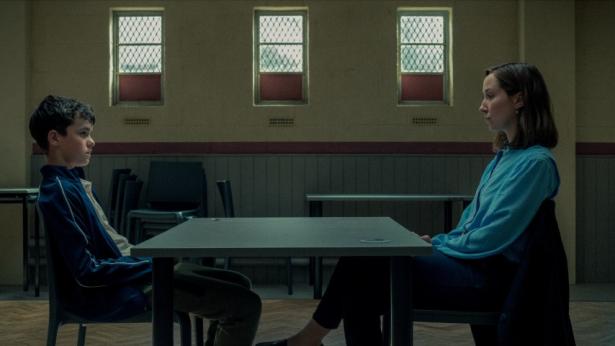Adolescence, Netflix’s chart-topping new drama, opens like any murder mystery (albeit one in which each installment is shot in single take). Jack Thorne and Stephen Graham’s British series kicks off with a thirteen-year-old kid arrested on suspicion of killing his female classmate. Jamie Miller (Owen Cooper, a star in the making in his onscreen debut) repeatedly proclaims his innocence as his house is raided, and he’s quickly taken to a detention center, strip-searched, and interrogated by the cops. And it’s hard not to empathize with his pleas when all you see is a child getting hurled in a police car and crying for his dad, Eddie (Graham). It’s particularly tough to watch through the lens of his helpless family, with Eddie accompanying Jamie around the facility and his mother and older sister anxiously awaiting updates in a waiting room.
This distressing first hour raises the central question of whether young Jamie could’ve taken a human life. What could have compelled him to do it and how would he have pulled it off? So it’s a jolt when the premiere closes with a definitive answer. The detectives display CCTV footage of Jamie stabbing Katie Leonard multiple times in a parking lot. Eddie looks at the video in disbelief as his son, still in denial, weeps. By confirming Jamie is the killer, Adolescence plays its ace fairly quickly. It’s not a formulaic whodunit at all but an insightful whydunit. Instead of guessing games, the series dissects the pervading influence of the manosphere and incel culture on an impressionable boy and how most parents and schools are unfortunately unequipped to recognize or deal with such ugly truths.
Adolescence takes on a serious topic that doesn’t require twists, making it stand out among crime shows like HBO’s excellent Mare Of Easttown and Sharp Objects (which also center around girls’ deaths). Those miniseries understandably feature jarring cliffhangers to build suspense so we can try to figure out the murderer’s identity. Adolescence tells us who it early on—and paves the way for its writers to drill down on Jamie’s motivations and mindset. There are no red herrings (like in AMC’s The Killing), court trials (Hulu’s Under The Bridge), or a media frenzy (ITV’s Broadchurch) here—and instead the audience just has to sit with the tragedy.
The focus is on portraying the vulnerabilities of a teen that make him susceptible to the toxic masculinity thriving in our hellish, easy-to-access digital landscape. Adolescence looks at how the ideology that comes with giving bigots a platform affects everyone around Jamie, his peers, and the community at large in their day-to-day lives. Episode two lays the groundwork for this by name-dropping misogynist alt-right loser Andrew Tate, the ridiculous 80/20 incel rule, and cyberbullying. But this drama’s true purpose is fleshed out most poignantly in its third hour.
Set seven months after Jamie’s arrest, the third episode is an almost hour-long, skin-crawling exchange between him and a psychologist responsible for his mental-health report. Left alone in a room, Jamie and Briony (Erin Doherty) have an eye-opening, emotional face-off. In their incisive writing, Thorne and Graham are unafraid to tackle how someone like Jamie—who hails from a loving, middle-class family, is intelligent, has a couple of close friends, and is otherwise “normal”—gets molded by the destructive ideas promoted about men and women in online forums.
Jamie is friendly, afraid, paranoid, resentful, arrogant, cocky, and briefly violent in his chat with Briony. He jokes with her and desires her approval, yet towers over her when she’s sitting down to feel big. His behavior is as transparent and scary as the words with which he expresses his thoughts about how he looks, Katie’s appearance, sexual experiences, porn, social media, and his family members. In explaining why he asked Katie out, Jamie tells Briony, “I just thought she might be weak.” At one point, he wonders whether the therapist thinks Katie—a dead girl—is a bitch, almost as a way to justify his actions because Katie rejected him. Jamie’s encounter with Briony is terrifying but heartbreaking: He is just a 13-year-old lad struggling with loneliness and seeking validation, only he looks for help in harmful places. When he accidentally confesses, the camera lingers on Briony processing it in a moment that you don’t often see in TV crime dramas.
The rest of the series deals with how Jamie’s parents handle his revelations a year later (with confusion, sorrow, and remorse at not being able to pick up on or control their child’s digital footprint). And while every episode being an immersive oner adds to the intensity, the third outing is the pivotal pressure cooker (with great performances by Doherty and Cooper to boot). While Adolescence is not based on a specific true story, the co-creators shared that they were inspired by several real incidents to make their work feel like it’s ripped from the headlines. And that’s as shocking and sobering as any plot twist.


Spread the word